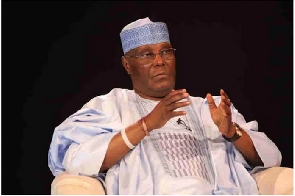The presidential candidate of the Peoples Democratic Party (PDP) in the 2023 election, Atiku Abubakar, is seeking an overturn of the judgement of the Presidential Election Petition Court due to its failure to take into cognisance the “Doctrine of Legitimate Expectation” regarding the failure of INEC to conduct the election in accordance with its own guidelines and the Electoral Act 2022.
Atiku, in his Notice of Appeal, dated September 18, filed by his lead counsel, Chief Chris Uche, SAN, submitted that the failure of the tribunal to apply the said doctrine was enough ground for the apex court to set aside the entire decision of the lower court.
Specifically in ground seven of his notice, Atiku maintained that the lower court erred in law when it failed to nullify the presidential election held on February 25, 2023, on the ground of non-compliance with the Electoral Act 2022.
The presidential candidate of the Peoples Democratic Party (PDP) in the 2023 election, Atiku Abubakar, is seeking an overturn of the judgement of the Presidential Election Petition Court due to its failure to take into cognisance the “Doctrine of Legitimate Expectation” regarding the failure of INEC to conduct the election in accordance with its own guidelines and the Electoral Act 2022.
Atiku, in his Notice of Appeal, dated September 18, filed by his lead counsel, Chief Chris Uche, SAN, submitted that the failure of the tribunal to apply the said doctrine was enough ground for the apex court to set aside the entire decision of the lower court.
Specifically in ground seven of his notice, Atiku maintained that the lower court erred in law when it failed to nullify the presidential election held on February 25, 2023, on the ground of non-compliance with the Electoral Act 2022.
Atiku submitted that INEC conducted the presidential election based on gross misrepresentation to the appellants and the general voting public that the presiding officers were going to electronically transmit the results of the election directly from the polling units to the 1st Respondent’s Collation System.
He said: “Contrary to the above unambiguous representations, undertakings, and guarantees, the 1st Respondent neither deployed the electronic transmission of election results nor the electronic collation system in the said election, sabotaging the raison d’etre for the enactment of the new Electoral Act 2022 and the introduction of the technological innovations.
“Rather than hold the 1st Respondent (INEC) as a public institution accountable to the representations that it made pursuant to its statutory and constitutional duties, which created legitimate expectations on the part of the Appellant, the lower court wrongly exonerated the 1st Respondent of any responsibility by holding that the use of the technological innovations to guarantee transparency was not mandatory.”
The former Vice President insisted that the February 25 poll was “conducted based on very grave and gross misrepresentation” and was, therefore, oppressive to the appellants, thus not free and fair, and not in accordance with the principles of the Electoral Act 2022.
Politics of Friday, 22 September 2023
Source: www.dailypost.ng
Atiku explains to Supreme Court why PEPC judgement is flawed
Entertainment












